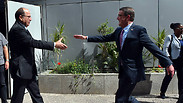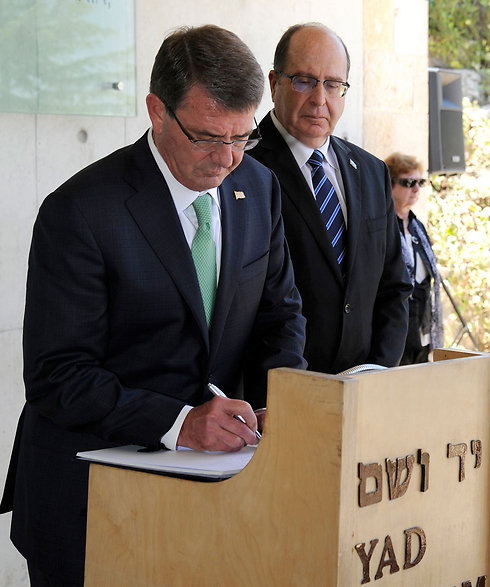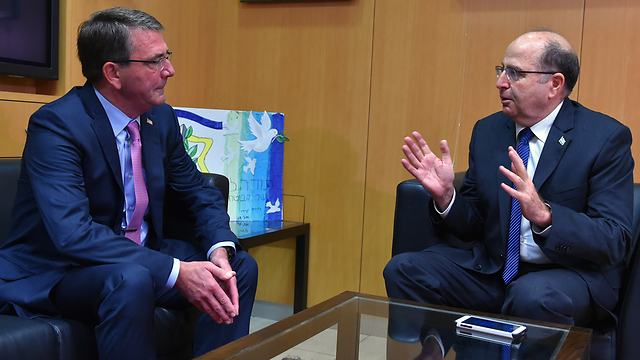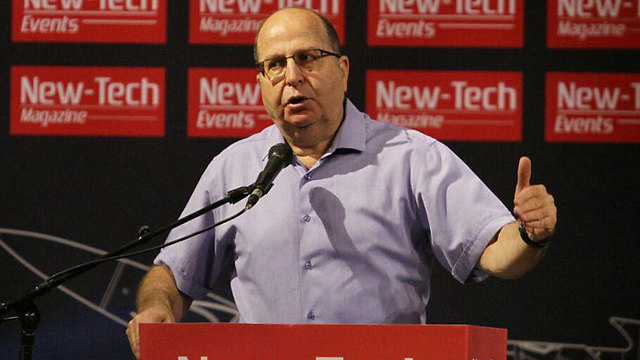
Netanyahu is pouting, Ya'alon is negotiating
Analysis: While the prime minister decided not to travel to the US to discuss the new 10-year military aid package to Israel, his defense minister did fly to Washington to talk business with his American counterpart.
Bibi is annoyed, and Bogie is travelling. The prime minister decided not to travel to the US and meet with Obama, as he doesn’t want to be in caught in a position where the Americans present him with a lower sum than what Israel requested in military aid for the next decade. But this doesn't bother Defense Minister Moshe Ya'alon, who left Saturday night for Washington to present the Israeli request to US Secretary of Defense Ashton Carter. It's the largest amount Israel has ever requested—a list of dreams.
Is the government speaking with two voices? Not exactly. It turns out that the negotiations over the sum are still underway. At his meeting with Netanyahu, US Vice President Biden presented the amount that the United States is considering. Netanyahu presented other numbers, and that hot potato went back to the US with Biden. The numbers range from $34 billion—a fair amount in the eyes of the Americans, who are demanding an Israeli commitment not to ask for an increase—to more than $40 billion, the amount required by Israel to have a qualitative edge against Saudi Arabia and the countries of the Gulf, as well as compensation for the dangers to which Israel has been exposed following the nuclear deal with Iran.
The defense establishment ran the numbers and found that, even before the compensation, the US administration should increase the amount in $37 billion just to stay within the framework of the aid given to Israel in the last decade, since there have been changes in the exchange rates and purchasing power of the dollar.
During Netanyahu's meetings with Biden, it became clear that Israel actually does have an interest in reaching the security aid agreement before the end of Obama's term, so Ya'alon went to Washington with the blessing of the prime minister. Both sides simply agreed to a different form of bargaining. If, in the past, the American budgetary framework was presented first and Israel fit its security needs into it, it's now reversed: first Israel presents its needs, and only then, in coordination with the Pentagon, will the budget, rate of assistance and order of priorities be set.

The Americans are not going to be surprised by the wish list that Ya'alon brought with him, since the US Department of Defense and the Israeli Ministry of Defense have been working on it for over a year. A few weeks ago, each of the IDF's branches presented the details of the equipment they wished to purchase to the IDF chief of staff and to Ya'alon, and the "wish list" was assembled.

The main items on the list are intended for the Air Force: finishing the increase of the number of F-35s to 50 aircraft and the addition of a third squadron over a decade; a squadron of the most advanced models of F-15s; the latest refueling aircraft KC-46 and a V-22 Osprey for the special forces. For the Air Force's heavy helicopter fleet, CH-47 Chinooks or the CH-53K King Stallion. Israel also requested modern radars and advanced technology.
The second priority is intelligence, and only after that are the land and naval forces. Here, as well, the focus is on purchasing new technologies and advanced armaments.
Meanwhile, the Americans are still haggling, not only aobut the size of the budget, but also about the equipment. The defense minister will try to close the deal with the US defense secretary, at least for the main portions of the Israeli wishlist, which will also ultimately affect the level of aid.











